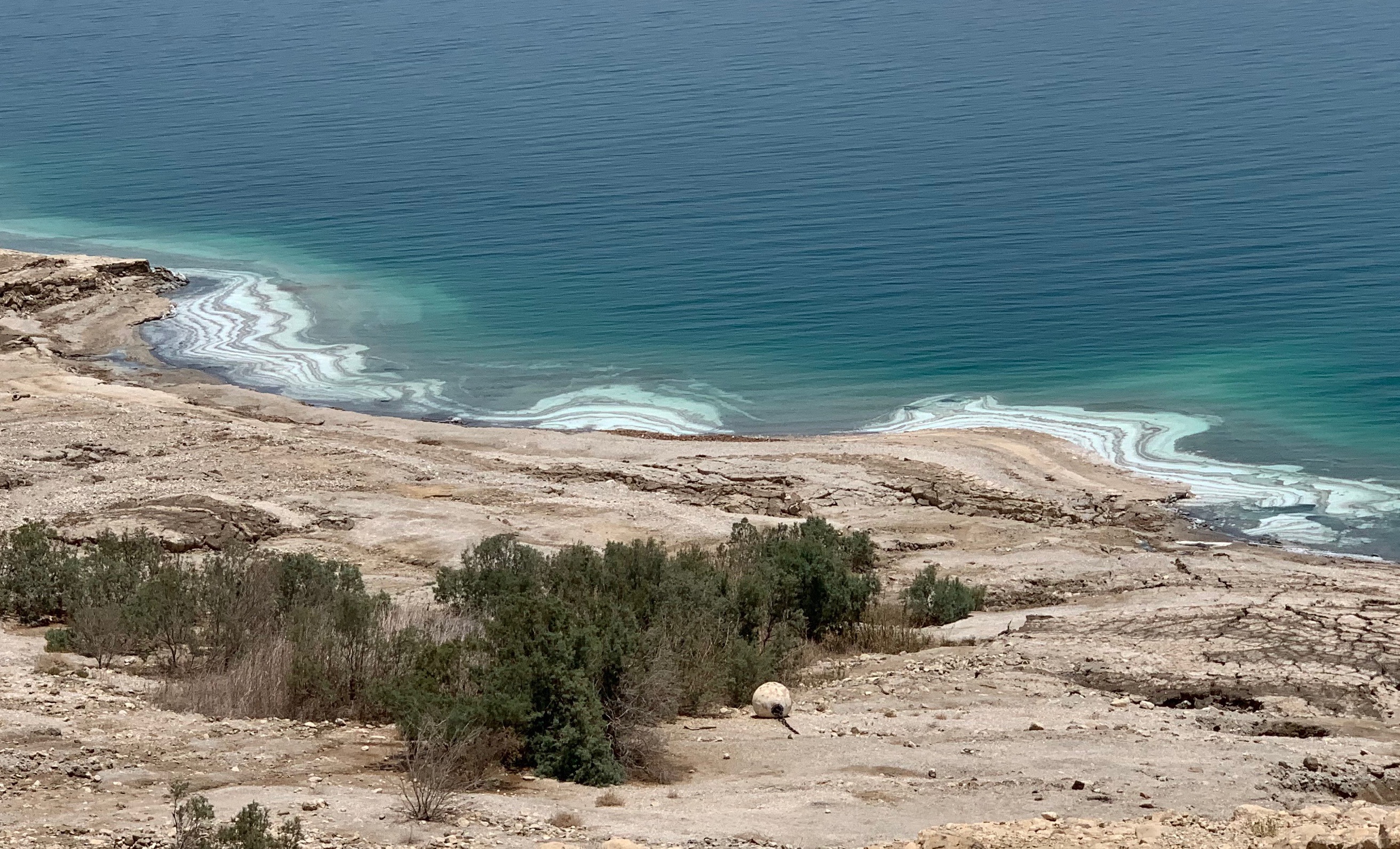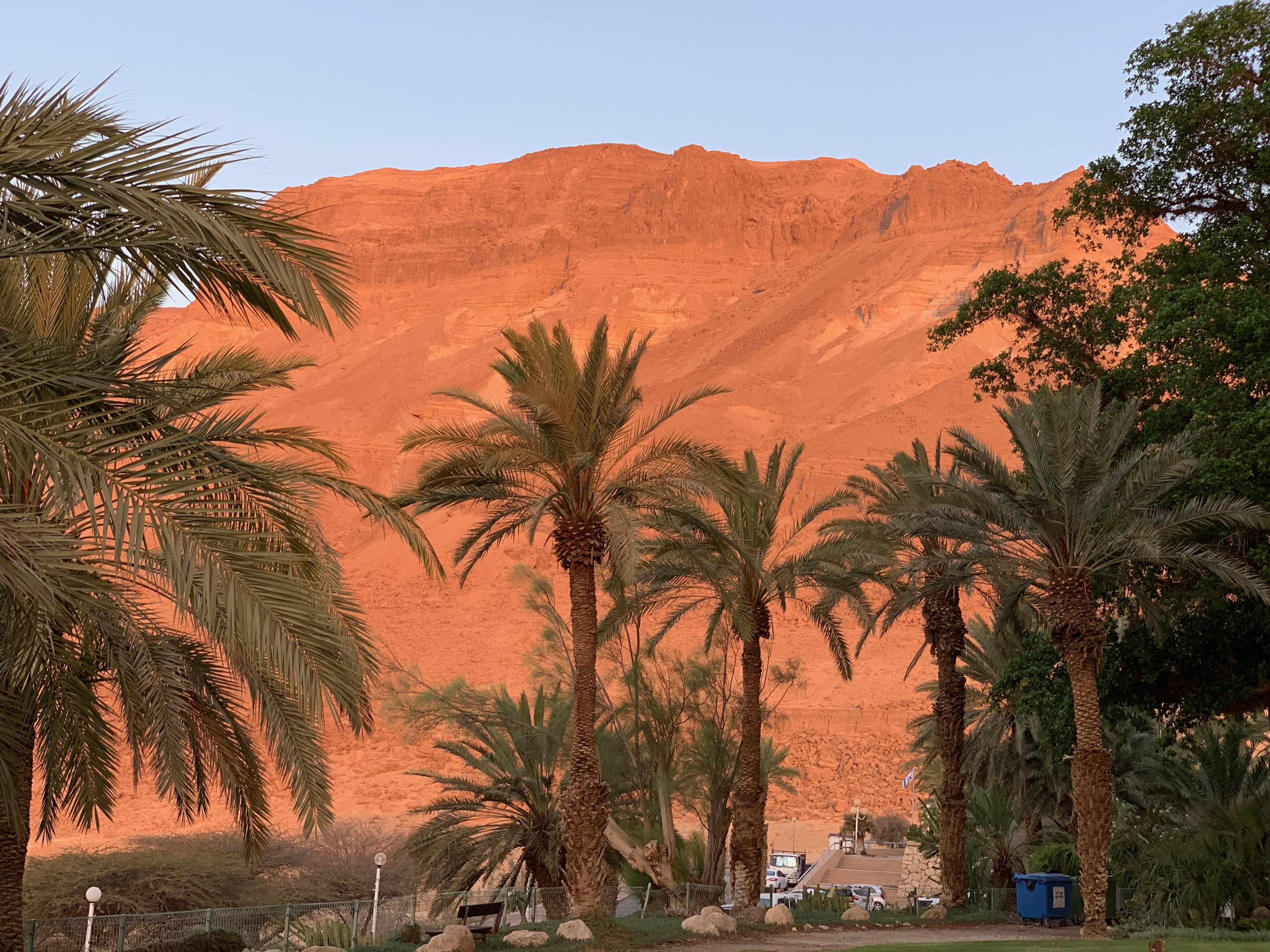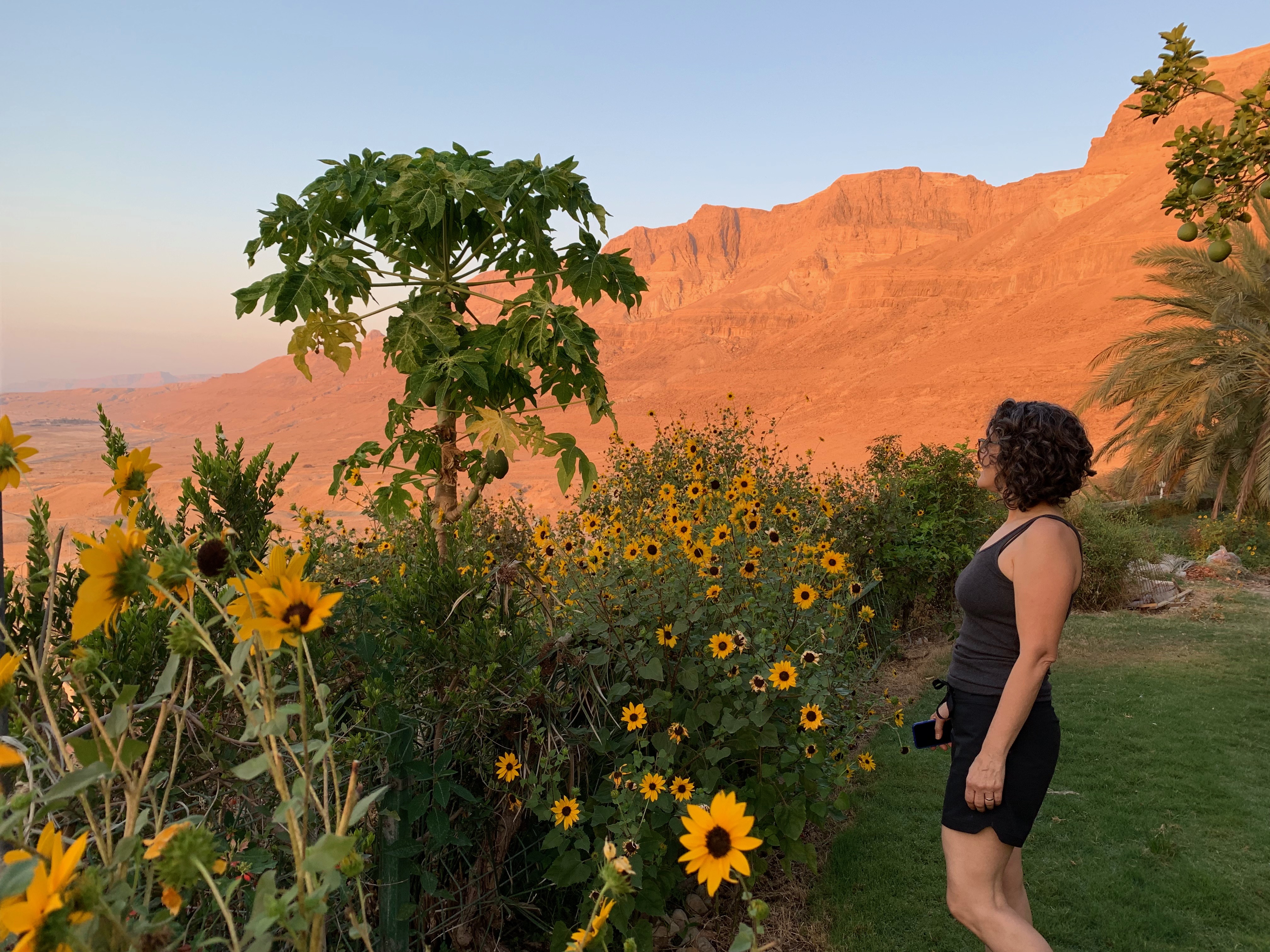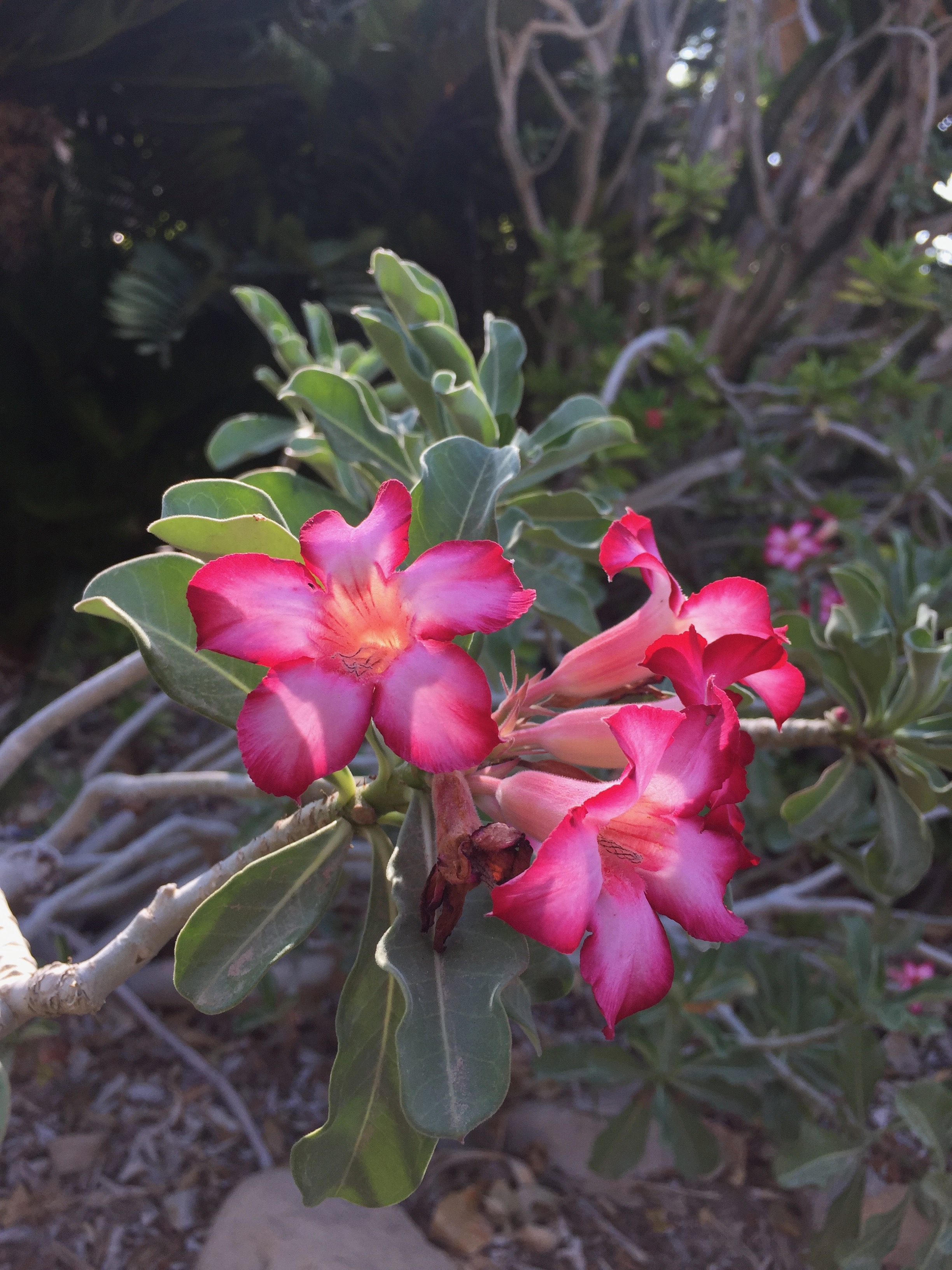Early Tuesday morning, we picked up our Budget rent-a-car and waved goodbye to the Holy City of Jerusalem, making our way east and south down to Ein Gedi, an oasis on the shore of the Dead Sea.

We arrived at our Airbnb, situated on the grounds of Kibbutz Ein Gedi and its botanical garden, in the early afternoon. With Zevin just emerging from his fever blues, another quiet day in the air conditioning suited him fine, and this matched the advice we were given by our entertaining and loquacious host: take it easy, explore the botanical garden and get an early start on the rest of the area the next day.
Eli, the owner of the apartment we stayed in, was the tour we never got in Jerusalem. His family had lived in Israel since before it was Israel: his mother’s side were Ukrainian Jews who had moved to Tel Aviv in the late 1800’s, and his father’s side were Russian Jews who had moved to Haifa in the 1920’s. His father, he told me, was one of the top geneticists in the world, and was responsible for the brown egg and the modern factory chicken.
Talking about the spirit of zionism that was blossoming in those days, he told us “my father did some work for the government, it was the British at that point, and they didn’t have enough money to pay them fully, so they offered them a little bit of money or some shit land in what is now Tel Aviv. That land, well, you know what’s on it now.
“I asked him, why didn’t you take the land? And he said ‘because we were there to build a country, not to be speculators.'”
His wife, Sima, was a Yemenite Jew (“she’s black, I’m white.”)
He had run the school on the kibbutz for years, and had helped found a program that brings Jewish 14-year-olds to Israel to study as part of a five-year program, so, as you can imagine, his knowledge of Jewish and Israeli history was deep, and he required little encouragement to share it.
Eli and Sima had raised their three children on a kibbutz near Tzfat (“we moved from the highest kibbutz in Israel to the lowest”, Ein Gedi being on the shore of the Dead Sea, the lowest land on Earth.) Their children were raised by the kibbutz, with groups of five children and two nannies living together in the dormitories. The parents would only see their children for a few hours a day, from a very young age: Eli recalled how Sima would get a phone call when it was time to nurse (he mimed the hand cranked phone used in those days.)
Kibbutzim were run on a socialist system: when you were hungry, you went to the kitchen and had food. You worked at whatever job you were assigned or that needed doing: nobody was paid. If you wanted to take a car somewhere, you went to the person who managed the cars, and if one was available, you took it.
Today, however, the kibbutz culture is largely dead. Almost all the kibbutzim were privatized in the early years of this century, with only a few holdouts remaining. This was echoed by a young couple we met in Tzfat, who had tried to join one of the remaining true kibbutzim, but found the old-timers had closed the doors to newcomers.
Eli saw the parallels between the rise and fall of communism and the kibbutz movement: “The tree has two branches. At its root was Marx and Engels, then one branch was Lenin (who’s grandmother was Jewish) and Trotsky and their gang, all Jews, and then the other branch was [Israel’s founding fathers, Theodor] Herzl and [David] Ben-Gurion. The eighteenth century was a time of upheaval, factories moving people to the cities and ending the rural way of life, and socialism gave people a predictability and purpose. You may not have a great job, you may not like it, but you had a job that you could count on, and you knew you would have it in twenty years.”
So when the Soviet Union began to fall apart in the early 1990’s, Eli says he wrote a letter from Russia to Israel’s Secretary of Education, saying “I have been given a gift, I have been sent in a time machine. What I am seeing here now, it is a time machine of what will happen in Israel soon.”
And it did, just as the communist system in the USSR dissolved and was privatized into capitalism, so the kibbutzim did the same about ten years later.
Even Kibbutz Ein Gedi, where we were staying, was not really a kibbutz anymore. When it was founded in the first half of last century, there were no roads in, and supplies had to be brought in monthly by air or boat. It was a settlement, placed there to stake the borders of the country.
But now, of the 400 or so residents, Eli said only about 150 were “members”. The rest were just workers in the hotel, restaurant and other businesses centered around the land. A small museum held artifacts and photos of their early days.
Still the whole place still had the feeling of an extended family. I walked with Eli to the commissary for falafel, and there were kids and families out playing in the winding paths between the houses, with the lush botanical gardens all around. A little child, who I’m sure spoke no English, was struggling to pedal his toy tractor up a little hill, and Eli helped him along with a grandfatherly push and the admonition to “pedal harder, you little son of a bitch.”

The parents, Eli told me, had all been his students years before.
Michelle, Zevin and I watched from our balcony the sun set on Israel, the Dead Sea and Jordan on the far side of that, and we mused about what the land below us had seen. Off to the south, we could see the tall promontory of Masada, a mesa that was the site of a legendary act of resistance by Jewish zealots against Roman imperial occupation. That would have to wait until tomorrow.

Michelle and Zev went to sleep while I stayed up to work on US hours. I slept for a few hours, then woke sometime around 2 am. Outside, the full moon sparkled in the waters below, and all was was silent and bright.











